- Home
- Chris Ryan
Alpha Force: Blood Money Page 18
Alpha Force: Blood Money Read online
Page 18
Try not to do anything to draw attention to yourself. If everyone is sauntering along a road, for instance, a quick sprint would be an excellent way of making sure everyone looks at you. If you decide it’s time for a different look, don’t put on your glasses in the street; pop into a shop and change. And you might try to disguise your normal way of walking or standing, but a Quasimodo imitation may draw admirers who think you are part of a street theatre, rather than let you get on with the job in hand.
Never make eye contact with your target. If you make eye contact with someone, they notice you – and usually wonder why you’re staring at them! They’ll certainly remember you after that and your cover will be blown.
Oh, and make sure you are aware of your surroundings, too, and not just focused on a target. Walking slap into a lamppost isn’t just a great way of being noticed by everyone around you; it also hurts!
5. Know your target’s routine
A bit of research might save you a lot of legwork. In Scotland we went through our target’s bins and learned a lot about him. Till receipts, cheque stubs, credit card bills and letters told us all the places he liked to go to. I followed him around Sainsbury’s one day. While he was shopping, his mobile rang, so I moved a bit closer to listen to what he was saying.
6. Keep the right distance
Don’t get too close to your subject – nor so far away that you lose them. Remember how easy it is in a city to turn a corner and discover a crowd, though, so be flexible. How close you go will depend on how many other people are around, what time of day or night it is, whether you are working alone or as part of a team, and all sorts of other factors. Girls can often get a bit closer to the target than guys because they don’t seem so threatening.
Vary your position behind a suspect. If, for instance, you begin by following along from the opposite side of the street, try crossing over at some point so that you are on the same side – a target will be less likely to notice you if you are not always in the same position. If they stop sometimes, overtake and then pause to look in a shop window before continuing behind once they have passed you again.
7. Act naturally
Use the local surroundings to act as natural as possible. If you’re in a shopping area, look in the windows. Buy a newspaper outside a station. Do all the ordinary things that others are doing, and this will also help to vary your pace and make you less noticeable.
You might find it helpful to have a prop or two. A female team-member might carry a handbag (a make-up mirror is excellent for seeing behind you, too) or you could have a sports bag to rummage in. Do make sure that anything you are carrying is inconspicuous and won’t make you stand out. Tip: carry an empty sports bag to rummage in and dump it during the operation. It is amazing how many people would notice you as ‘person with bag’ and then see someone totally different if suddenly you are without the bag.
If you act naturally it’s surprising what you can get away with. Again, on the mission in Scotland, the target had meetings in a café every morning. The café was always full. I walked in, bought a coffee and looked for somewhere to sit. There were two extra chairs at the table where the target was sitting, so I walked up and asked, ‘Mind if I sit here?’ I was told, ‘Go ahead.’ So I sat down, got out my magazine and pretended to read. Actually I was listening to everything that was said – what the target was up to and where he was going. This meant we didn’t even have to follow the target for the rest of the day! I had to be careful only to show my left side, though – in my right ear I had an earpiece I was using to communicate with the others and if the target had seen that the whole mission might have been blown. You have to be constantly aware of who’s around you and what they can see.
8. Be very careful how you start
You’re most likely to be rumbled when you’re starting a surveillance operation. If you sit outside the target’s house waiting for them to come out, a neighbour might spot you and call the police before you’ve gone anywhere. If you wait at their usual bus stop, but never get on a bus, it also looks suspicious. It might be better to start covertly – hide in a bush outside the target’s house and radio to your mates when they come out.
9. When it goes wrong . . .
If you think the target has spotted you, act as naturally as possible and do everything possible to make them doubt their suspicion.
Walk past, catch a bus without looking back – anything to make them feel they were wrong to feel they were being followed.
Tell the others in your team so that someone else can take over. If you are working alone, accept that you have lost the target and be prepared to try again another day.
Always pull off if you’re not sure – otherwise you might ruin the whole mission.
Be very aware of what you would do if you spotted someone following you. Would you test them by doubling back on yourself? Cross the road, and then cross back again? If your target begins doing any of these things, they may simply be being careful – but it is far more likely they have spotted you. Try to hand over to a team member in a non-suspicious manner and then abandon the pursuit yourself.
Your target might even try actively to lose you. The classic way of doing this is to go into a department store – they can lose you in the crowds and there are often too many exits for you to cover.
10. Avoid danger
Most important of all, under no circumstances do anything that could put you in danger of any kind. If the target seems to be leading you into shadowy areas or dead-ends, don’t take the bait. Better to withdraw and wait for support from team members than to take any kind of risk. This is vital. Most surveillance operations involve following someone with a regular routine so there will always be another day.
BE SAFE!
Random House Children’s Books and Chris Ryan would like to make it clear that this advice is given for use in a serious situation only, where your life could be at risk. We cannot accept any liability for inappropriate usage in normal conditions.
Table of Contents
Cover
Copyright
Also by Chris Ryan
About the Author
Alpha Force: Blood Money
Prologue: The Kidney Man
Chapter 1: Snake
Chapter 2: Business As Usual
Chapter 3: Bride Burning
Chapter 4: A Kidney for Sale
Chapter 5: Friendship
Chapter 6: Organ Thieves
Chapter 7: Trilok
Chapter 8: Kidnap Watch
Chapter 9: Gone
Chapter 10: Prisoner
Chapter 11: On the Trail
Chapter 12: Chennai
Chapter 13: Conspiracy
Chapter 14: Undercover
Chapter 15: The Clinic
Chapter 16: The Donor
Chapter 17: Clue
Chapter 18: Tests
Chapter 19: Cruel City
Chapter 20: Men In Power
Chapter 21: Monsoon
Chapter 22: Into the Morgue
Chapter 23: The Courier
Chapter 24: The End Of the Line
Chapter 25: Backup
Chapter 26: Eye Bank
Chapter 27: Closing In
Chapter 28: Contact
Chapter 29: Evidence
Chapter 30: Time Running Out
Chapter 31: Three-Thirty
Chapter 32: Passengers
Chapter 33: Cornered
Chapter 34: End Of a Long Day

 Global Strike
Global Strike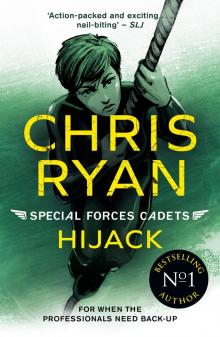 Hijack
Hijack Special Forces Cadets 2
Special Forces Cadets 2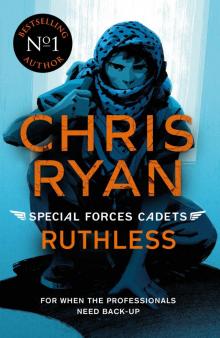 Ruthless
Ruthless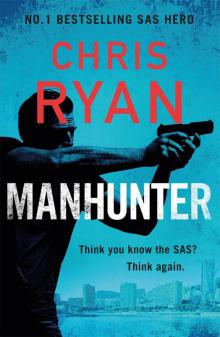 Manhunter
Manhunter Special Forces Cadets 1
Special Forces Cadets 1 Red Strike
Red Strike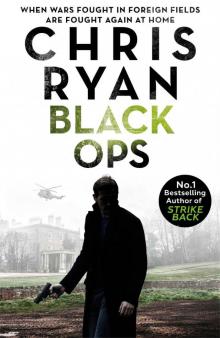 Black Ops
Black Ops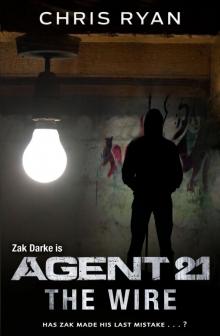 Agent 21: The Wire
Agent 21: The Wire Land of Fire
Land of Fire Alpha Force: Fault Line
Alpha Force: Fault Line Under Cover (Agent 21)
Under Cover (Agent 21) Endgame (Agent 21)
Endgame (Agent 21) Red Centre
Red Centre Blackout
Blackout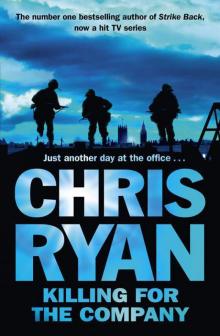 Killing for the Company
Killing for the Company The Watchman
The Watchman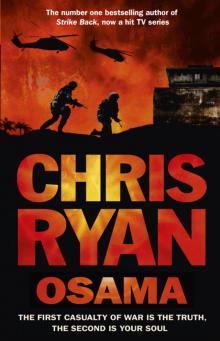 Osama
Osama Who Dares Wins
Who Dares Wins The Kremlin Device
The Kremlin Device Hunter Killer
Hunter Killer Alpha Force: Untouchable
Alpha Force: Untouchable Stand By Stand By
Stand By Stand By Chris Ryan Extreme: Hard Target: Mission Four: Fallout
Chris Ryan Extreme: Hard Target: Mission Four: Fallout Greed mb-1
Greed mb-1 Alpha Force: Desert Pursuit
Alpha Force: Desert Pursuit Strike Back
Strike Back Greed
Greed The Bay Bulls Standoff
The Bay Bulls Standoff Stand By, Stand By gs-1
Stand By, Stand By gs-1 Outbreak
Outbreak Hunted
Hunted Vortex cr-4
Vortex cr-4 Rat-Catcher
Rat-Catcher Vortex
Vortex Bad Soldier
Bad Soldier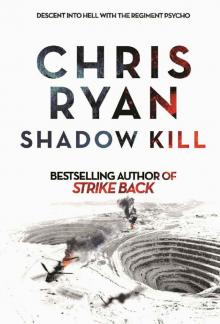 Shadow Kill: A Strikeback Novel
Shadow Kill: A Strikeback Novel Murder Team (Kindle Single)
Murder Team (Kindle Single) One Good Turn
One Good Turn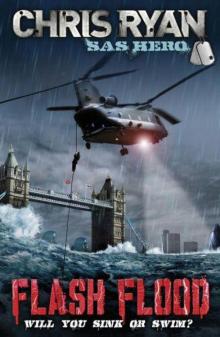 Flash Flood cr-1
Flash Flood cr-1 Night Strike
Night Strike Wildfire
Wildfire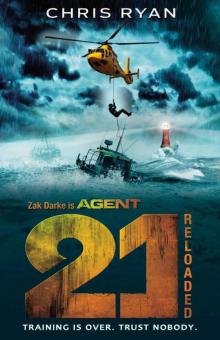 Agent 21: Reloaded: Book 2
Agent 21: Reloaded: Book 2 Chris Ryan Extreme: Hard Target: Mission Two: The Rock
Chris Ryan Extreme: Hard Target: Mission Two: The Rock Masters of War
Masters of War Murder Team
Murder Team War Dog
War Dog Wildfire cr-2
Wildfire cr-2 Survival
Survival The One That Got Away - Junior edition
The One That Got Away - Junior edition The Hit List
The Hit List The Kill Zone
The Kill Zone Medal of Honor
Medal of Honor Battleground
Battleground Twister
Twister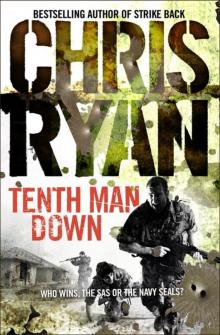 Tenth Man Down gs-4
Tenth Man Down gs-4 The Kremlin Device gs-3
The Kremlin Device gs-3 Hostage
Hostage Bad Soldier: Danny Black Thriller 4
Bad Soldier: Danny Black Thriller 4 Alpha Force: Blood Money
Alpha Force: Blood Money Firefight
Firefight Chris Ryan Extreme: Hard Target: Mission One: Redeemer
Chris Ryan Extreme: Hard Target: Mission One: Redeemer Hit List
Hit List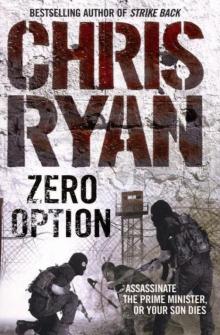 Zero Option gs-2
Zero Option gs-2 Black Gold
Black Gold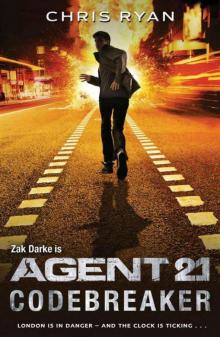 Agent 21: Codebreaker: Book 3
Agent 21: Codebreaker: Book 3 Zero Option
Zero Option Ultimate Weapon
Ultimate Weapon Tenth Man Down
Tenth Man Down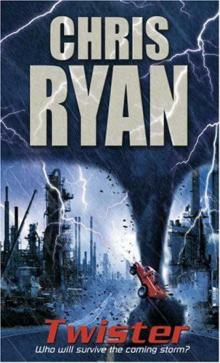 Twister cr-5
Twister cr-5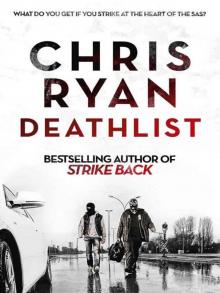 Deathlist
Deathlist Hellfire
Hellfire Flash Flood
Flash Flood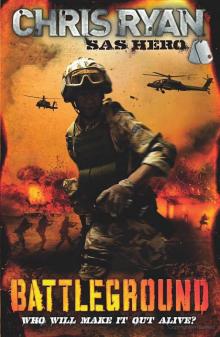 Battleground cr-6
Battleground cr-6 The Increment
The Increment